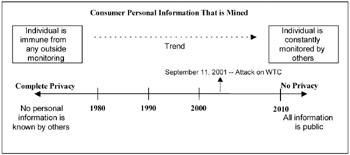FUTURE TRENDS
As our world becomes more interconnected, it will be possible to create detailed profiles on practically anyone. "According to one estimate, there are now 2.5 million surveillance cameras in Britain, and the average Briton is now thought to be photographed by 300 separate cameras in a single day" (Rosen, 2001, p. 24). The line between private and public information continues to shift with time (Figure 2). What was once considered private is now more likely contained in the public domain. The shift can greatly be attributed to the increased use of databases and the more recent use of the Internet as a way to collect and manipulate information (Caudill & Murphy, 2000). In a recent article, legal scholar Jeffrey Rosen (2001) stated that:
As shown in Figure 2, the events of September 11, 2001 (which prompted new legislation and concern) have greatly excelled the rate at which information is changing from the private domain to the public domain. Looking back at Table 3, we may see more future legislation that will in fact invade privacy rather than protect it. Relating back to Figure 1, at some point, enough individuals will be negatively impacted so that society will react by implementing legal countermeasures that prohibit and restrict all aspects of the data industry. It is in businesses' best interest to behave in the most ethical manner possible, so as not to create an environment in which lawmakers feel compelled to act. What does the future hold for data mining? After the events of September 11, 2001, society will more than likely demand that government institute anti-terrorist measures in which data mining will play a fundamental role. However, "Britain's experience in the fight against terrorism suggests that people may give up liberties without experiencing a corresponding increase in security" (Rosen, 2001, p. 24). Businesses will continue to encroach on personal privacy. Therefore, it is up to individuals to guard their personal data. Currently, a number of researchers are investigating the use of distributed data-mining systems that operate over large-scale networks spanning several companies (K. Scott, 2001). Such systems could be used by the financial industry, for example, to detect fraud and intrusions. Luckily for consumers, companies historically have not collaborated nor shared data. Instead, security has been achieved primarily by limiting access via virtual private networks using passwords and firewalls. As companies collaborate, special care must be taken to protect the privacy of those whose data is shared. Application Service Providers (ASPs) hosting Internet-based data-mining services are emerging as an attractive alternative for organizations needing such services who are reluctant to incur the high cost of buying, installing, training, and using data-mining software (Krishnaswamy, Zaslavsky, & Loke, 2001). These researchers propose a new multiple ASP model for the Internet delivery of data-mining services. This model has several advantages over the currently predominant, single-server provider model that requires a client to send its data to the service provider with whom it has a long-term service level agreement (SLA): (1) wider variety of options, (2) choice of service providers, and (3) the benefits of a more competitive marketplace (Krishnaswamy, et al.). However, some ethical concerns arise. For instance, consider the situation where the data to mine is sensitive and disclosure of any sort would cause grave harm. In that case, the client will not want to transport the data, but would rather have the ASP use mobile agents to perform the data mining on the client's server and destroy itself upon completion. Furthermore, confidentiality agreements would need to be signed each time an ASP is contracted to perform data mining. A multiple ASP model greatly complicates the possibility for ethical and legal dilemmas in the future.
| |||||||||||||||||||||||||||||||||
| | |||||||||||||||||||||||||||||||||
EAN: 2147483647
Pages: 194

